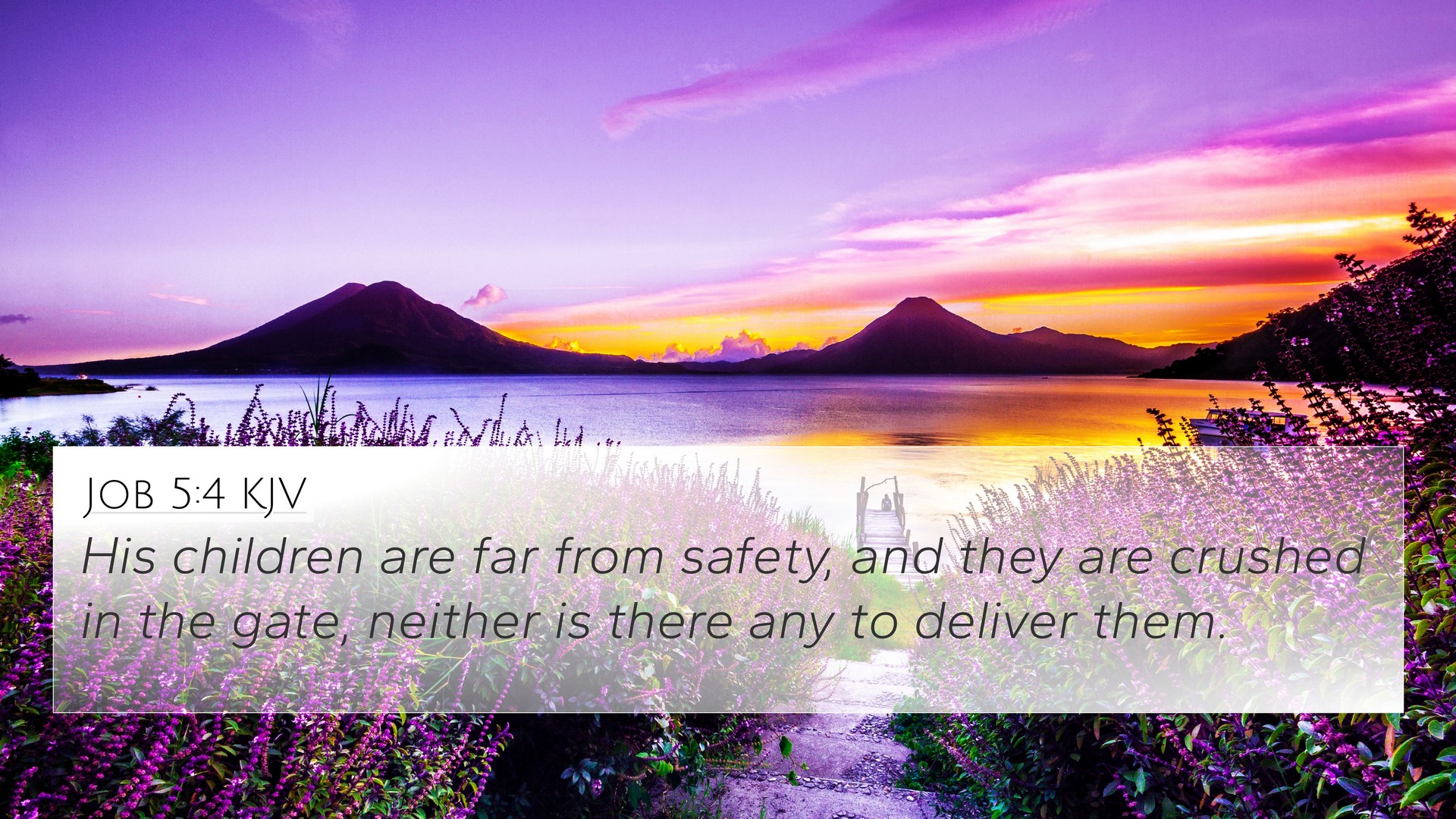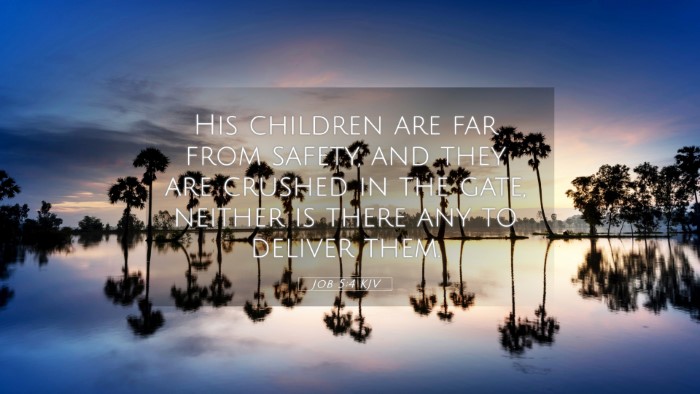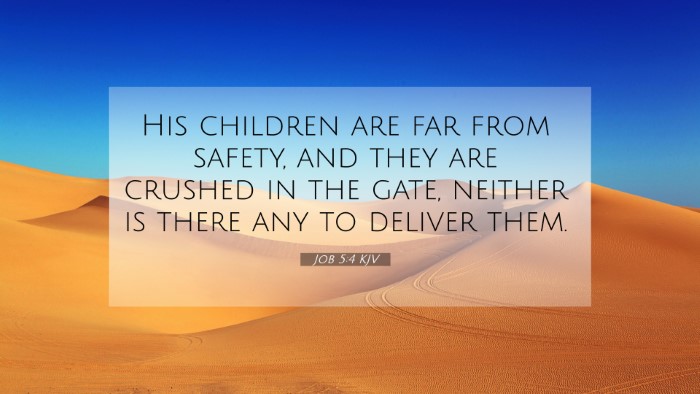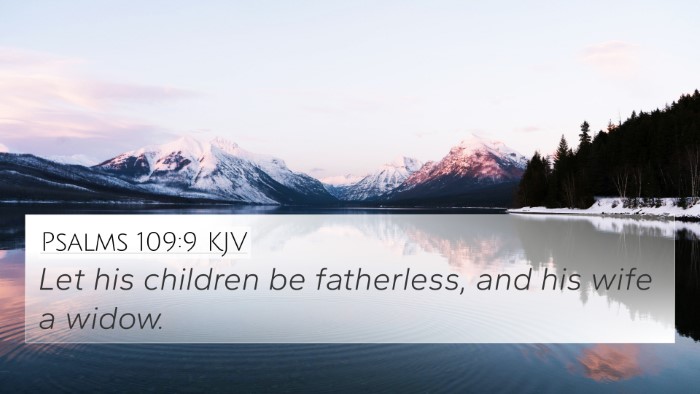Old Testament
Genesis Exodus Leviticus Numbers Deuteronomy Joshua Judges Ruth 1 Samuel 2 Samuel 1 Kings 2 Kings 1 Chronicles 2 Chronicles Ezra Nehemiah Esther Job Psalms Proverbs Ecclesiastes Song of Solomon Isaiah Jeremiah Lamentations Ezekiel Daniel Hosea Joel Amos Obadiah Jonah Micah Nahum Habakkuk Zephaniah Haggai Zechariah MalachiJob 5:4 Similar Verses
Job 5:4 Cross References
His children are far from safety, and they are crushed in the gate, neither is there any to deliver them.
Uncover the Rich Themes and Topics of This Bible Verse
Listed below are the Bible themes associated with Job 5:4. We invite you to explore each theme to gain deeper insights into the Scriptures.
Job 5:4 Cross Reference Verses
This section features a detailed cross-reference designed to enrich your understanding of the Scriptures. Below, you will find carefully selected verses that echo the themes and teachings related to Job 5:4 KJV. Click on any image to explore detailed analyses of related Bible verses and uncover deeper theological insights.
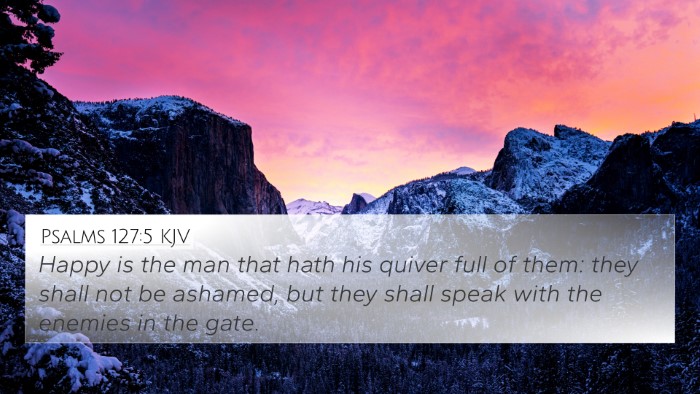
Psalms 127:5 (KJV) »
Happy is the man that hath his quiver full of them: they shall not be ashamed, but they shall speak with the enemies in the gate.
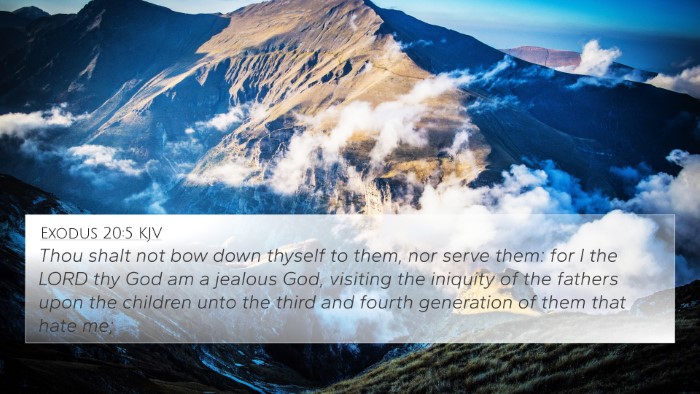
Exodus 20:5 (KJV) »
Thou shalt not bow down thyself to them, nor serve them: for I the LORD thy God am a jealous God, visiting the iniquity of the fathers upon the children unto the third and fourth generation of them that hate me;
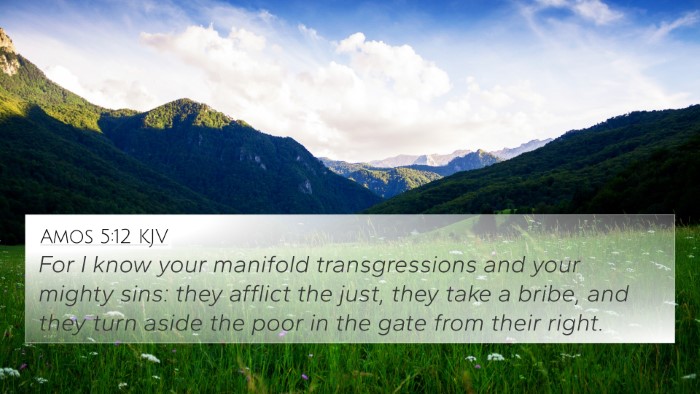
Amos 5:12 (KJV) »
For I know your manifold transgressions and your mighty sins: they afflict the just, they take a bribe, and they turn aside the poor in the gate from their right.

Psalms 7:2 (KJV) »
Lest he tear my soul like a lion, rending it in pieces, while there is none to deliver.
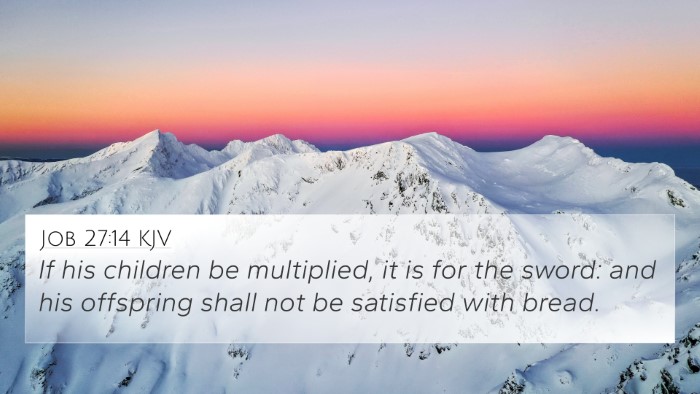
Job 27:14 (KJV) »
If his children be multiplied, it is for the sword: and his offspring shall not be satisfied with bread.

Job 1:19 (KJV) »
And, behold, there came a great wind from the wilderness, and smote the four corners of the house, and it fell upon the young men, and they are dead; and I only am escaped alone to tell thee.

Job 8:4 (KJV) »
If thy children have sinned against him, and he have cast them away for their transgression;

Job 4:10 (KJV) »
The roaring of the lion, and the voice of the fierce lion, and the teeth of the young lions, are broken.
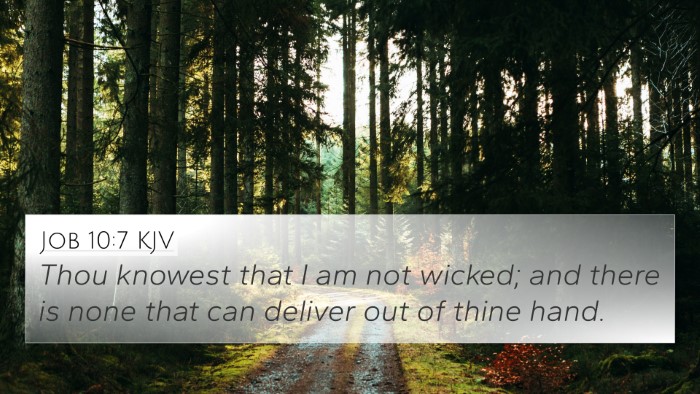
Job 10:7 (KJV) »
Thou knowest that I am not wicked; and there is none that can deliver out of thine hand.

Luke 13:4 (KJV) »
Or those eighteen, upon whom the tower in Siloam fell, and slew them, think ye that they were sinners above all men that dwelt in Jerusalem?
Job 5:4 Verse Analysis and Similar Verses
Understanding Job 5:4
Job 5:4 states:
"His children are far from safety, and they are crushed in the gate, neither is there any to deliver them."
This verse reflects a profound insight into the trials faced by Job and expresses the sorrow of a father's heart amidst despair. Through a combination of interpretations from various public domain commentaries, we can delve deeper into its meaning.
Verse Context
Job 5:4 is part of a larger discourse delivered by Eliphaz, one of Job's friends, who attempts to explain Job's suffering. In this context, Eliphaz blends personal experience and traditional wisdom to assert that suffering is often a result of sin and that the righteous prevail.
Commentary Insights
-
Matthew Henry:
Matthew Henry emphasizes that this verse reflects the calamities that befall the children of wicked parents. When an individual walks away from God’s teachings, they expose themselves and their children to dire consequences. This observation speaks to the tragic repercussions of a life lived outside of divine guidance.
-
Albert Barnes:
Barnes points out that the reference to children being "far from safety" indicates not only physical danger but a spiritual estrangement from God. The imagery of being "crushed in the gate" further illustrates a complete breakdown of safety and societal support, aligning with the desolation that can occur when individuals reject divine wisdom.
-
Adam Clarke:
Clarke expands upon the notion of "deliverance," stressing that it might symbolize the lack of intercession on behalf of the wrongdoers. The absence of help in crisis underscores a broader theme of accountability where the absence of divine support is evident in dire circumstances.
Thematic Connections
This verse can be linked to various other instances in Scripture that address suffering, familial implications of sin, and divine justice. Here are some connections that can deepen the understanding of Job 5:4 through a cross-referencing approach:
- Proverbs 14:32: "The wicked is driven away in his wickedness: but the righteous hath hope in his death." - This verse reinforces the idea of the righteous finding safety while the wicked face consequences.
- Psalms 37:28: "For the Lord loveth judgment, and forsaketh not his saints; they are preserved forever: but the seed of the wicked shall be cut off." - There is a clear distinction between the fate of the righteous and the wicked.
- 1 Peter 5:8: "Be sober, be vigilant; because your adversary the devil, as a roaring lion, walketh about, seeking whom he may devour." - This speaks to the dangers that can threaten not just individuals but their families if one strays from vigilance.
- Deuteronomy 5:9: "Thou shalt not bow down thyself unto them, nor serve them: for I the Lord thy God am a jealous God, visiting the iniquity of the fathers upon the children unto the third and fourth generation of them that hate me." - This highlights generational consequences of sin.
- Lamentations 5:7: "Our fathers have sinned, and are not; and we have borne their iniquities." - This verse connects the suffering faced by current generations with the sins of their forebears.
- Jeremiah 31:30: "But everyone shall die for his own iniquity: every man that eateth the sour grape, his teeth shall be set on edge." - A reminder of personal accountability for one’s actions.
- Romans 6:23: "For the wages of sin is death; but the gift of God is eternal life through Jesus Christ our Lord." - This provides a New Testament reflection on the consequences of sin.
- Isaiah 3:11: "Woe unto the wicked! It shall be ill with him: for the reward of his hands shall be given him." - A direct warning of the fate awaiting the wicked.
- James 1:15: "Then when lust hath conceived, it bringeth forth sin: and sin, when it is finished, bringeth forth death." - This illustrates the cycle of sin leading to dire consequences.
- Hebrews 12:6: "For whom the Lord loveth he chasteneth, and scourgeth every son whom he receiveth." - This verse connects to Job’s suffering as a form of divine correction.
Tools for Bible Cross-Referencing
Understanding the relationships among different Bible verses can significantly enhance your study of scripture. Here are some valuable tools and methods:
- Bible Concordance: A detailed alphabetical index that offers scripture references for specific words and themes.
- Bible Cross-Reference Guide: These guides are excellent for identifying connections between verses that share themes or messages.
- Cross-Reference Bible Study: Involves finding connected verses and themes to develop a comprehensive understanding.
- Bible Reference Resources: Tools that help in exploring related scriptures and their implications.
- Cross-Referencing Bible Study Methods: Techniques such as thematic studies, parallel passage analyses, and chronological studies can aid in deepening your interpretation.
- Comprehensive Bible Cross-Reference Materials: These include books and software that compile verses, making it easier to see connections.
Conclusion
Job 5:4 serves as a poignant reflection on the trials of life, the consequences of sin, and the overarching theme of divine justice. By utilizing cross-referencing methods and tools, believers can uncover deeper insights and understand the broader narrative that connects various scriptures. This approach not only enhances one’s personal study but also enriches communal discussions and teachings within a spiritual context.
